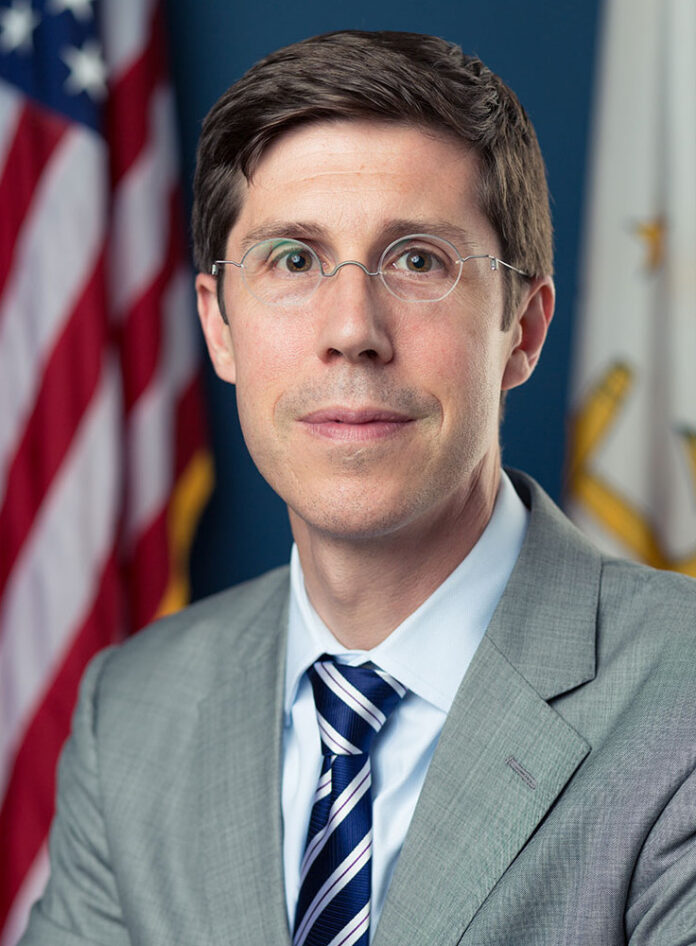PROVIDENCE – Less than 24 hours out from their hard-won primary victories, state and local candidates are gearing up for general election races.
However, not Brett Smiley, who is already laying the groundwork to take over as the capital city’s leader. With no Republican or independent candidates to challenge him in November, Smiley is all but guaranteed the Providence mayoral seat after winning the Democratic primary on Tuesday.
Smiley is already focused on the transition, having met with outgoing Mayor Jorge O. Elorza earlier Wednesday, and planning to unveil a formal transition plan and team in “the coming weeks,” he said in an interview on Wednesday.
“I don’t have a 100-day plan but I have a day-one plan and I get to start on some of that now,” Smiley said.
His eagerness to delve into his new role was matched by the enthusiasm of city business groups and advocates, who are already bending his ear to remind him of their interests and priorities.
Smiley’s calendar is quickly getting filled by meetings and appearances with these organizations: he appeared on a Zoom call for The Providence Foundation’s monthly members meeting Wednesday morning and is slated to attend the Greater Providence Chamber of Commerce board meeting on Sept. 16.
Meanwhile, Liza Burkin, organizer of the Providence Streets Coalition, said she planned to include Smiley in the installation and data collection for a temporary bike lane along Hope Street in the hopes that his involvement would bolster his support for the project and the citywide bike lane network.
None of these groups endorsed Smiley or his opponents, Gonzalo Cuervo and Nirva LaFortune. But that doesn’t mean they weren’t happy with the outcome.
Cliff Wood, executive director for The Providence Foundation, expressed confidence in Smiley’s experience at the state and local level. Smiley most recently served as a top aide to former Gov. Gina M. Raimondo.
“Really, we are just glad to know the outcome,” Wood said. “Now, we can be more focused, get a sense of where we are going.”
Having nearly four months to prepare for taking office, compared with the month and a half afforded candidates who still have to face a general election, Smiley has a clear advantage, said Joseph R. Paolino Jr., a former Providence mayor and downtown developer.
“By the time he starts in January, he can have his whole team already in place,” Paolino said.
Elorza, who had already spoken with Smiley after his win, called it “an added opportunity to get everything in order.”
That’s particularly important given the unfinished programs and projects Elorza will hand over to Smiley, from the ambitious Great Streets plan to racial reparations, a pilot guaranteed income program, and transformation of Greater Kennedy Plaza.
Wood and Paolino were both eager to start working with Smiley to ensure their priorities get adequate attention from the mayor-elect: downtown development, safety and pandemic recovery, to name a few.
Laurie White, president of the Providence Chamber, said the business services group took particular interest in the city’s office of economic development and hoped Smiley might expand the department in a similar vein to how Raimondo changed the R.I. Commerce Corp., giving the group its own secretary and elevated prominence in state government.
While all three mayoral candidates shared similar views on many big issues such as education and policing, Smiley distinguished himself by making his campaign about improving basic city services: street paving, snow-plowing and trash removal, said Wendy Schiller, a political science professor at Brown University.
“He had one message, he ran on one message consistently throughout and it was believable,” Schiller said.
Recent flooding that left cars stranded on the highway and buildings collapsing in Providence gave Smiley an even greater opportunity to make his case for improving city infrastructure. In the wake of the storm’s destruction, Smiley’s campaign released a detailed infrastructure plan aimed at preventing and responding to these kinds of disasters.
These kinds of practical plans may have resonated more with voters than the left-leaning ideology of Smiley’s competitors, Schiller said.
That was the case for Paolino, at least, who said he found merits in all three candidates but ultimately backed Smiley because the other two candidates were “too far left.”
Paolino, who served as city mayor from 1984 to 1991, likened the job to a mechanic, focused on day-to-day nitty gritty rather than lofty policy.
“When you’ve got to plow the roads, it doesn’t matter if you’re progressive or conservative,” Paolino said. “You just plow the snow.”
Smiley’s ample campaign war chest also helped him edge out his opponents, allowing him to spend money on TV ads where LaFortune and Cuervo did not.
“Nirva couldn’t raise the money that she needed to get on TV,” Schiller said. “She is excellent on TV and excellent in debates, so I can see where that hurt her.”
While Cuervo’s endorsement from Elorza may have scored him some additional support, it could have hurt him among voters who had grown disenchanted with the outgoing mayor, Schiller said.
“In order to be effective, Elorza’s endorsement for Cuervo really had to cut into Smiley’s base, which I don’t think it did,” she said.
Asked if there was anything he could have done differently to help boost support for his candidate, Elorza said he couldn’t speculate as to what compelled voters to choose who they did. He also said that any of the three candidates were well equipped to lead the city.
How many people voted was also a deciding factor, with strong participation on Providence’s East Side – Smiley’s stronghold – helping propel him to victory. Cuervo and LaFortune appealed to a similar base of more diverse and progressive voters who split their support in a way that hurt both candidates, Schiller said.
Smiley nevertheless pointed out that he received support from neighborhoods across the city. He pledged to continue reaching out and soliciting feedback from residents and organizations citywide during this transition time.
“I have been campaigning in Providence for a year and a half,” Smiley said. “I have deep, longstanding, personal relationships across the city and I want to, and plan to, continue to be accessible.”
(This story has been updated to include comments from Brett Smiley and Laurie White.)
Nancy Lavin is a PBN staff writer. You may reach her at Lavin@PBN.com.












